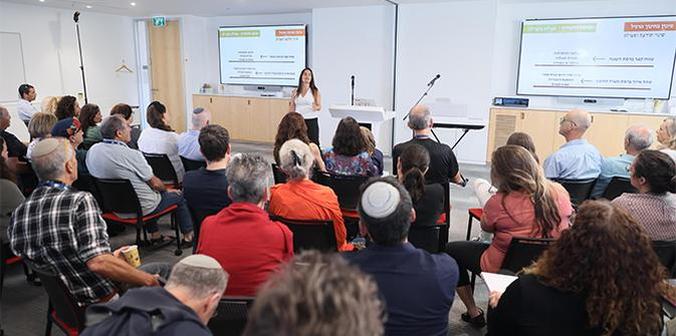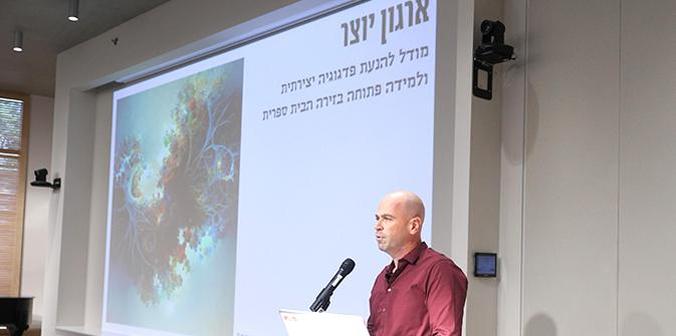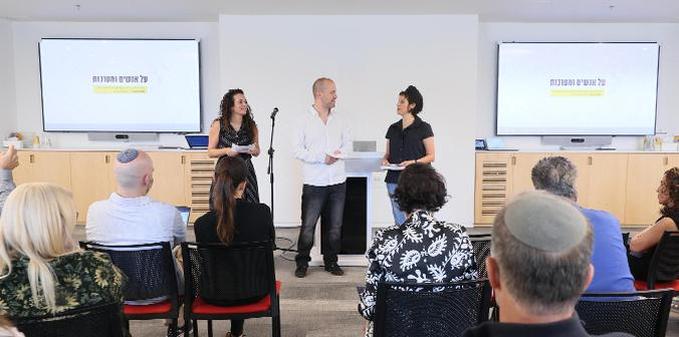 The fellows of Cohort 30 present their final projects (Photo: Sivan Shachor)
The fellows of Cohort 30 present their final projects (Photo: Sivan Shachor)
In a celebratory two-day event at the Mandel Headquarters in Jerusalem, the fellows of Cohort 30 of the Mandel School for Educational Leadership, who are currently concluding their studies, presented their final projects. The project presentations at the conclusion of the curriculum bring together the different processes of learning and development that fellows undergo during their two years of study. The summative document written by each fellow, combined with the presentation, offers a window into the topic that they studied and developed during their educational journey – a journey that included conceiving the idea, reviewing professional literature on research and practice, and proposing actions to bring about change.
The fellows presented their work to an audience that included fellows, faculty, and graduates of the Mandel School, as well as their personal mentors, directors and faculty members of other units of the Mandel Foundation–Israel, and other experts and leaders in Israeli education and society.
 Ohad Hoffman presents his final project (Photo: Sivan Shachor)
Ohad Hoffman presents his final project (Photo: Sivan Shachor)
The presentations were divided into six sessions that reflected the diversity of topics explored by the fellows. These topics included different views on learning; lenses for social change; children and youth at risk; individuals, systems, and the relationships between them; tracks and junctions in education; and alternative ways of thinking about communities and communication. As an example, fellow Keren Apfelbaum Riff, a social entrepreneur and ordained rabbi, presented her work on a project that is designed to heal the rift in Judaism in Israel that is intensified by Israel's sectoral education system, which is divided into state-secular, state-religious, and Haredi streams.
Obour Taha-Reziq, a social worker and former community center director, presented his project, which aims to create a common future within Arab society and between Arab and Jewish society in Israel by developing cultural and communal projects and fostering a positive depiction of Arab society within Israeli society.
In their remarks to the fellows, several speakers noted the crisis in which Israeli society finds itself today and pointed to the heightened need for educational leadership at the present time.
Moshe Vigdor, director general of the Mandel Foundation–Israel, emphasized the importance of measured, wise voices in the current era of disagreement, and encouraged the fellows to foster good, “each according to their own path and their own beliefs.”
 One of the six presentation sessions (Photo: Sivan Shachor)
One of the six presentation sessions (Photo: Sivan Shachor)
“You arrived at the Mandel School two years ago with a sense of mission, an inner voice calling you to educational leadership,” said
Efrat Aran, director of the Mandel School for Educational Leadership. “Even in your worst nightmares, you could not have imagined the dire need that there would be for your leadership in Israeli society in the summer of 2023. But it seems that nothing is random. To paraphrase Mordechai’s message to Esther in the Purim story: ‘Who knows? Perhaps you have come to educational leadership for just such a time?’”
Dr. Yehuda Ben-Dor, who had been the dean of fellows in the first year of their program, spoke about education as a constant process of striving for humanity in the full meaning of the word, and about the challenge of seeing the Other, particularly the different Other, rather than placing oneself at the center. At the close of the two days,
Dr. Ayal Shaul, the dean of fellows in the second year, led the fellows in writing personal thoughts that they can carry with them as they return to their educational practice.
